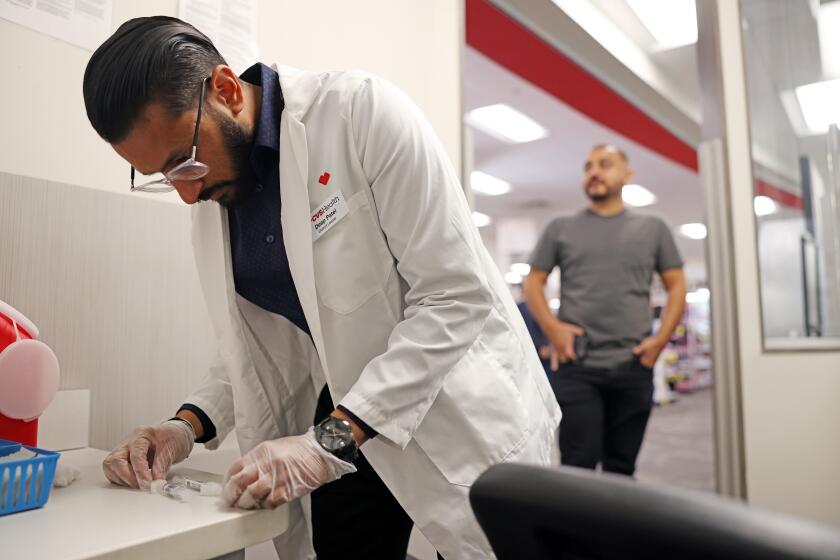FDA launches tougher oversight of dietary supplements
The Food and Drug Administration said Monday it plans to beef up oversight of the sprawling, $50 billion-a-year dietary supplements industry, warning that the sector’s explosive growth has resulted in risks to consumers — such as an increase in supplements “spiked” with unlisted drug ingredients and false and misleading claims about health benefits.
The agency underscored the need for greater oversight by announcing it had sent 12 warning letters and five advisory letters earlier this month to companies the FDA said are selling dozens of products that contain unapproved drugs or use illegal claims for treating Alzheimer’s and other serious diseases.
FDA Commissioner Scott Gottlieb said the agency is planning policy changes that could lead to the most important regulatory modernization since enactment of the 1994 Dietary Supplement Health and Education Act, which considers supplements safe until proved otherwise.
Gottlieb said in an interview that although most supplement makers are responsible, the huge growth in the industry has allowed “bad actors” to sell dangerous products or ones that carry unproven claims. “I’m concerned that changes in the supplement market may have outpaced the evolution of our own policies and our capacity to manage emerging risks,” he said.
Under the 1994 law, dietary supplements are regulated as food and, therefore, are not subject to pre-market approval or the kind of safety and effectiveness testing required for drugs. Since the law was enacted, the industry has grown from 4,000 products and $4 billion a year in sales to as many as 80,000 products and $50 billion in sales, according to the FDA.
While the FDA doesn’t clear the products ahead of time, it is charged with removing unsafe supplements from the market.
Three out of four Americans take a dietary supplement on a regular basis, and for older Americans the proportion is four out of five, the agency said. One in three children also take supplements.
Gottlieb said he plans a “balanced approach” to improve safety, reduce inaccurate claims and encourage industry innovation. For example, the agency plans to create a rapid-response tool to quickly alert the public if a supplement contains an illegal and potentially dangerous ingredient. It intends to streamline the handling of supplements containing prescription drugs, such as the generic version of Viagra, and to increase enforcement actions.
In a nod to the industry, he said the agency would review its regulations on new dietary ingredients to make sure they are flexible enough to ensure product improvements. He promised to call a public meeting to discuss that and other topics.
Gottlieb also waded into an intense debate over whether there should be a mandatory FDA registry where supplement makers would be required to list their products and ingredients. He said mandatory listing “could provide significant benefits by improving transparency in the marketplace” and allowing the FDA to focus its enforcement efforts. But he acknowledged that such a major change likely would require legislation.
Manufacturers are supposed to register their facilities with the FDA — but are not required to list their products or ingredients. It’s not clear how many are complying with the minimal requirement. The result is that the agency doesn’t have a clear idea of who is making what.
Sandra Eskin, who directs the food safety project at the Pew Trusts, welcomed Gottlieb’s comments and stressed the need for mandatory listing. “FDA needs to know what supplement products each company makes, as well as the ingredients and copies of the product labels,” she said. “This information is the cornerstone of an effective oversight and enforcement system, and Congress should require that supplement companies provide it to the agency.”
Steve Mister, president and chief executive of the Council for Responsible Nutrition, which represents supplement makers, said in a statement that the FDA “shares our vision to further develop the thriving, innovative and safe marketplace for dietary supplements.”
Increasingly, officials and public health experts have become concerned about unsafe ingredients — such as the active ingredients in drugs, often from overseas — showing up in supplements. An analysis published in October, written by a team from the California Department of Public Health, found unapproved and sometimes dangerous drugs in 746 dietary supplements, almost all of them marketed for sexual enhancement, weight loss or muscle growth. The drugs included sildenafil — the active ingredient in Viagra — and steroids in muscle-building products.
In the fall, the FDA warned consumers to avoid Rhino male enhancement products that contained sildenafil. It said it had received reports of people experiencing chest pain, severe headaches and prolonged erections after taking a Rhino product. The agency also warned companies marketing supplements for opioid addiction that contained an unapproved antidepressant called tianeptine.
Dietary supplement makers are allowed to make what are called “structure/function claims” on how a nutrient or dietary ingredient affects the body — for example, “calcium builds strong bones.” But they aren’t permitted to say their products treat or cure specific diseases such as osteoporosis. Such claims would mean the product would be regulated as a drug and subject to pre-market approval requirements.
Laurie McGinley reports for the Washington Post.



